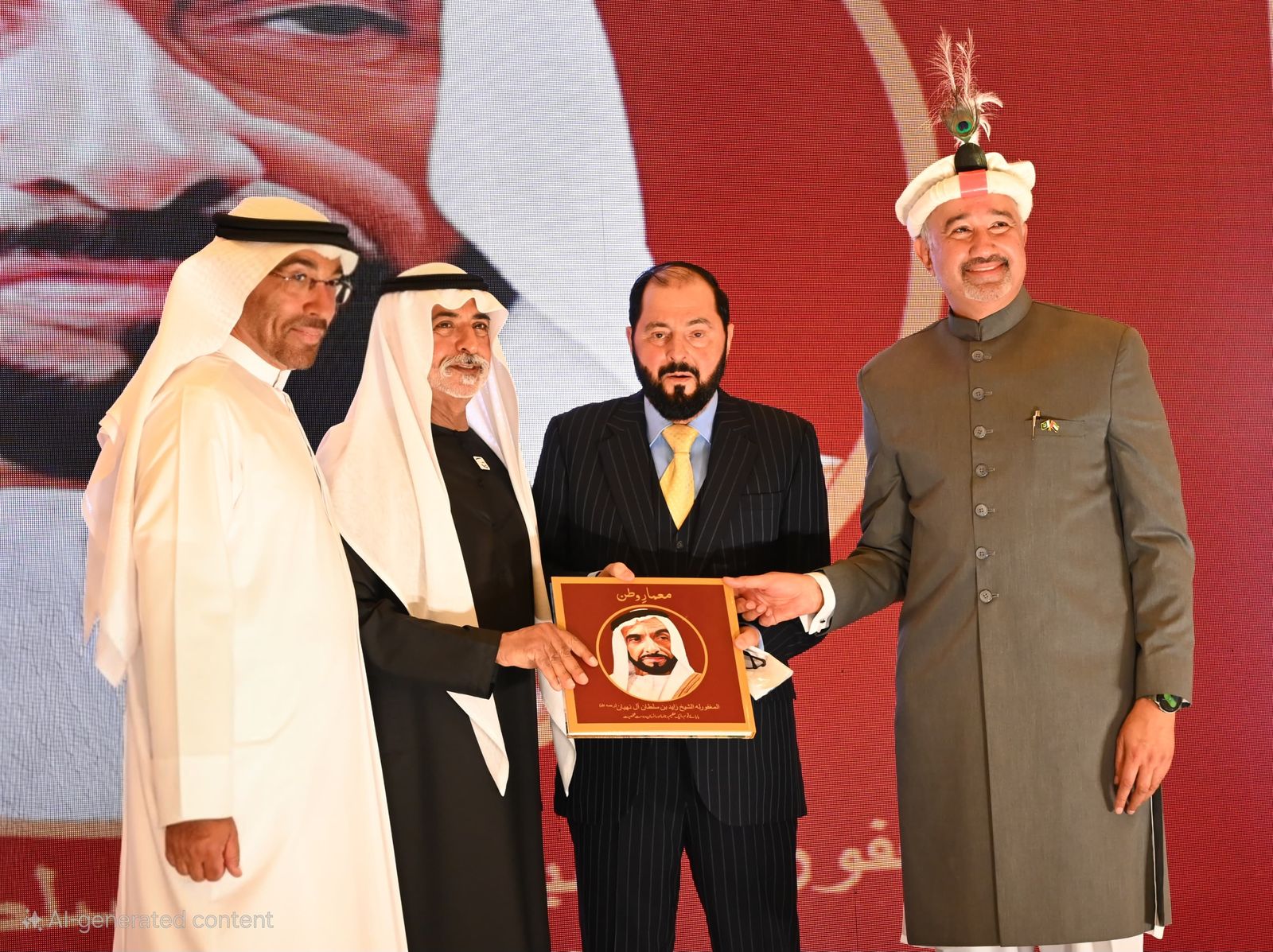Monitoring Desk: The contribution of Pakistan’s Ambassador to the UAE, Faisal Niaz Tirmizi, for writing a new chapter of Pakistan-UAE bilateral relations has been recognized by the UAE.
The Minister of Tolerance and Coexistence of the UAE, Sheikh Nahayan Mabarak Al Nahyan, lauded Ambassador Tirmizi’s efforts in strengthening diplomatic ties between the two nations. The event was organised under the patronage of UAE Vice President and Deputy Prime Minister Sheikh Mansour bin Zayed Al Nahyan.
Related Story: Embassy of Pakistan held a grand event of Pakistan Day in Abu Dhabi
It is pertinent to mention that Pakistan’s Ambassador to the UAE, Faisal Niaz Tirmizi, since the beginning of his assignment as the envoy of Pakistan in the UAE, has been arranging seminars, discussions, B2B events, and placing Pakistan in international expos and festivals being held in the UAE. His latest contribution to Pak-UAE relations was clubbing Pakistan Day in UAE with UAE’s National Day, where the Embassy of Pakistan launched a book about the life and work of Sheikh Zayed bin Sultan Al Nahyan. This was first ever book launched by Pakistan Embassy as a tribute to the founding father of the UAE, the Embassy also launched a book on the Life and Works of the Late Sheikh Zayed bin Sultan titled “Sheikh Zayed Maimaar-e-Watan,” written by a prominent Pakistani, Khan Zaman Suroor during celebration of Pakistan Day in UAE. The book is a homage from the Pakistani community to the people and the Government of the UAE. Khan Zaman was a teenager when he arrived in the UAE.
The book is not just a Biography rather it is an account of the Legacy of Unity and Compassion. Mimar-E-Watan: A Country Builder is not merely a historical account of Sheikh Zayed bin Sultan Al Nahyan’s life—it is a profound celebration of his enduring legacy. This book beautifully intertwines personal anecdotes, geopolitical influence, and heartfelt tributes to reveal how one man’s vision transformed a desert into a thriving nation while leaving an indelible mark on Pakistan. Beyond politics and development, it is a story of humanity, showcasing how leadership rooted in empathy can bridge cultures and generations.
“Mimar-E-Watan” is an intimate portrait through personal memories of the author. What sets this book apart is its deeply personal perspective. Khan Zaman Soroor, the author, does not write as a distant observer but as someone who witnessed Sheikh Zayed’s humility first-hand. His childhood memories—playing with Sheikh Khalifa bin Zayed and the genuine warmth with which the leader engaged with ordinary people—paint a vivid picture of a ruler who shunned pomp and privilege. These stories humanize a figure often seen only through the lens of statecraft.

One of the most important sections of the book recounts a pivotal 1999 meeting between Sheikh Zayed and a Pakistani delegation. When Soroor and his group arrived at Al Bahr Palace, expecting a brief courtesy visit, they were instead embraced with extraordinary warmth. What was meant to be a 15-minute exchange stretched into two hours of heartfelt conversation. Sheikh Zayed’s words, “Pakistan is a second homeland,” were not mere diplomacy; they reflected his lifelong commitment to the nation. The book highlights his numerous contributions to Pakistan’s infrastructure, education, and healthcare.
Sheikh Zayed’s principles—unity, sustainability, and selfless service—were not just political strategies but a way of life. The book delves into how he brought fractious tribes together under one flag, not through force but through trust and shared purpose. His respect for elders, dedication to environmental conservation, and belief in empowering people rather than ruling over them offer timeless lessons for modern leaders.
While Sheikh Zayed’s passing left a void, his successors have faithfully upheld his vision. The book connects his philosophies to the leadership of Sheikh Khalifa and Sheikh Mohammed bin Zayed, who have expanded UAE-Pakistan ties through continued philanthropy, investment, and cultural exchange. This seamless transition of values underscores how Sheikh Zayed’s influence was not confined to his lifetime but planted seeds for future generations.
In an era where leadership is often measured by power rather than compassion, “Mimar-E-Watan” serves as both a tribute and a guide. It challenges readers to reflect on what true nation-building entails—not just skyscrapers and economies, but fostering dignity, unity and mutual respect. For Pakistanis, it is a reminder of a friendship built on actions, not just words. For global audiences, it is a blueprint for meaningful governance.
With its blend of personal narrative, historical depth, and universal wisdom, “Mimar-E-Watan” transcends the typical biography. It is a reminder that the greatest leaders are those who touch lives quietly, lead with integrity, and leave the world better than they found it.
